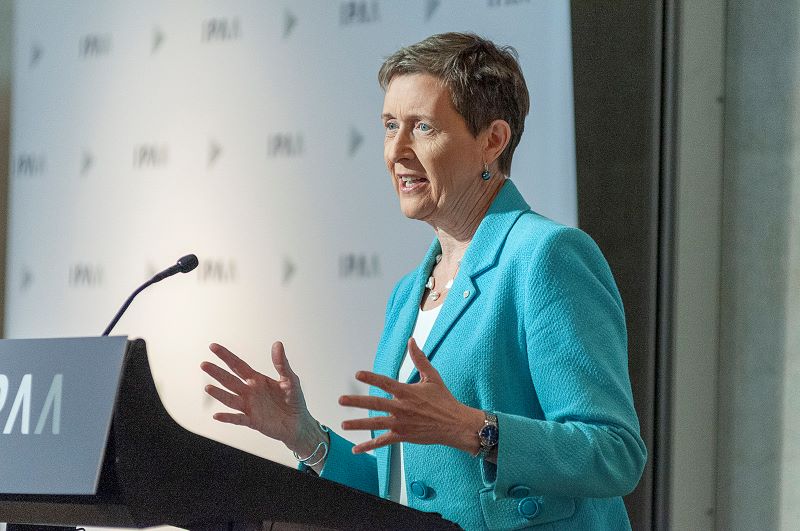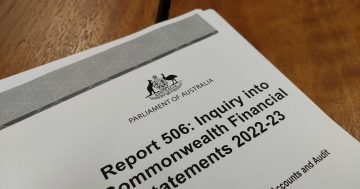
Former department secretary Rosemary Huxtable has delivered a review of the APS Secretaries Board. Photo: IPAA.
The powerful APS Secretaries Board has agreed to look like it is starting to think about maybe embracing recommendations listed in a review of itself.
The board, which comprises all department secretaries and the APS Commissioner, met in April and, among other things, “considered the Review of the Secretaries Board undertaken by Ms Rosemary Huxtable AO PSM” over January and February this year.
In a sparsely worded communique of the meeting, the board “agreed an approach to implementing the review’s recommendations”.
What that approach is wasn’t outlined.
Former Department of Finance secretary Huxtable, who as recently as August 2022 was a member of the Secretaries Board herself, found little to criticise in how the board functions.
She made eight recommendations nonetheless.
Twenty-two face-to-face interviews with board members, members of the board secretariat and executive in the Department of the Prime Minister and Cabinet and key personnel from select board sub-committees were conducted to assess the board’s effectiveness.
A review of the minutes of board meetings between October 2022 and December 2023, as well as the minutes, membership, and terms of reference of board sub-committees, was also perused.
Comparisons were also made with equivalent bodies operating in New Zealand, the United Kingdom and Canada.
Ms Huxtable provided an oral update to the board early in February and delivered a draft of her report later that month. The full report was considered in the most recent gathering of the secretary bosses.
Predictably, she found the board to be doing a good job.
“The general view expressed in interviews was that the board works well, is collegiate and collaborative, able to have honest discussions and sets a good tone across the APS,” Ms Huxtable said in her report.
“It has benefited from new secretaries being appointed and bringing with them fresh ideas and different ways of working, particularly those with experience in other jurisdictions.
“While significant areas of disagreement are rare, dissenting views can be voiced and discussions occur in a respectful way.”
The reviewer did note, however, that the secretaries are better at talking to each other than they are at communicating beyond their circle.
She also mentioned a dilemma of prioritising between the board and individual departments.
“The board was seen as largely fulfilling its legislative functions across stewardship, APS improvement strategies, collaboration and modelling leadership behaviours, with less success in the area of external engagement,” she said.
“There continues to be a tension between the board as a forum for collective action and decision-making and the responsibilities of individual board members as accountable authorities for their organisations.”
With all that said, the review listed recommendations that could hardly be described as challenging.
The first is that the board continues its First Nations priorities but focuses on “significant cross-portfolio actions, milestones and accountabilities.”
The second recommendation is to continue with a priority on APS reform, with a focus on “strategic cross-portfolio issues”.
Third, a one-hour session at the start of each board meeting be set aside for strategic discussion comprising (a) an update from the chair (PM&C Secretary Glyn Davis) on government priorities and emerging issues, (b) an economic and fiscal update, (c) an international and national security update, and (d) a general discussion on emerging risks and strategic issues.
Recommendation four is that the board agree to an annual work program that informs the commissioning of work and participation of others in board meetings to form an annual work program.
Fifth is for an executive of the board to be established to “set the board agenda, identify item sponsors and co-optees, engage with sub-committee chairs, provide a quality assurance check on board papers and sign off on action items”.
Actions arising from board meetings would then be mapped and responsibilities assigned through an “action register”, with progress monitored and reported at each board meeting.
Recommendation six is for an annual strategy session to consider the purpose and work of subcommittees to “ensure alignment with the annual work program.”
“Should sub-committees be retained, there should be a clear line of sight between the work of a sub-committee and the board, a process to equitably allocate members and chairing responsibilities across sub-committees, and sun-setting provisions to ensure regular review,” the review states.
The seventh recommendation is that the board deploy a range of methods to enable information exchange with senior leaders in government, business and the community and with international counterparts. External speakers at the monthly board meetings should be limited to instances requiring a “one-way flow of information to secretaries and where there is no ready alternative”.
Finally, recommendation eight is that secretaries meet annually off-site for one to two days to support “deeper, policy-oriented discussions” and establish the forward work program for the board and its committees.
Quite easy then to agree on “an approach” to implementing the review’s recommendations.
Original Article published by Chris Johnson on Riotact.










